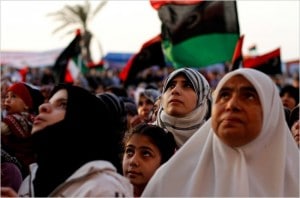Libya Revolt Sidelines Women, Who Led It
May 20, 2011
 New York Times – BENGHAZI, Libya — In recent days, after weeks of delays and closed-door meetings, rebel leaders here have announced a slate of new appointments, including a defense chief and a minister for reconstruction and infrastructure. They have added members to a national council, to represent areas in southern, central and western Libya, all in an effort to bolster the revolution, better represent the country as a whole and — in the event that Col. Muammar el-Qaddafi bolts — make civil war unlikely, the rebel leaders explained.
New York Times – BENGHAZI, Libya — In recent days, after weeks of delays and closed-door meetings, rebel leaders here have announced a slate of new appointments, including a defense chief and a minister for reconstruction and infrastructure. They have added members to a national council, to represent areas in southern, central and western Libya, all in an effort to bolster the revolution, better represent the country as a whole and — in the event that Col. Muammar el-Qaddafi bolts — make civil war unlikely, the rebel leaders explained.
But one group has been lost in the reshuffling — women. While the fledgling rebel government has more than doubled in size, women now occupy just 2 of the 40 or so positions in the leadership. A woman had been expected to be named to be education minister, but after a number of candidates were passed over or refused the job, a man is now expected to take over the ministry.
For a revolutionary movement that was started by women — the female relatives of men killed in one of Colonel Qaddafi’s jails — their exclusion at the highest levels is alienating longtime democracy activists and has added to concerns about decision-making in the three-month-old movement, which seems to grow more inscrutable by the day.
“We are having a problem now,” said Hana el-Gallal, a prominent human rights lawyer who was said to be a candidate for the education position. “In the old regime we didn’t have any voice in the economic and political sector. Now, in these two sectors we don’t have any presence.”
Enas Eldrasy, a 23-year-old radiation therapist, recently quit her job working for the national council, in part because she said she was relegated to busy work. “When the revolution started, women had a big role,” she said. “Now, it’s dissolved, it’s disappeared. I don’t know why.”
Salwa Bugaighis, a lawyer who took an early leading role in the revolution, said: “We want more. I think it’s important to be in the place where they make the decisions.”
Other women say they are not overly concerned about the lack of women in leadership roles, saying that the governing structures are temporary and reflect the rush to keep the rebel areas from descending into chaos.
“I’m not at all worried,” said Molly Tarhuni, an independent analyst in Benghazi who is studying the rebel movement.
“This is so temporary and transitional. I don’t think it’s fair to say it’s microcosmic of what will happen in the future. I think women are going to play an immense role.”
Click here to read the New York Times article.

